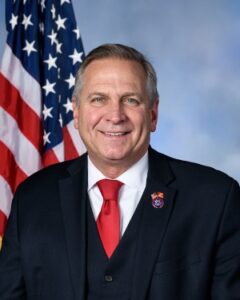WASHINGTON, DC — Legislators and agency watchdogs are concerned about the lack of strong, sustained leadership at VA’s highest levels. Part of the worry is about the department’s ability to carry through on major projects and enact the provisions of recent legislation, as well as learn from previous mistakes.
This was the topic of the House Veterans Affairs Committee’s first full oversight hearing of the new Republican Congress—one that used the topic of leadership and accountability to touch on numerous hot-button issues, including community care, the PACT Act, the upcoming budget negotiations and whistleblower retaliation.
Committee Chair Rep. Mike Bost (R-IL) opened the hearing quoting the VA Inspector General (OIG) on criminal incidents at VA facilities in Arkansas and West Virginia that led to patient deaths.
“These failures were the consequences of disengaged leadership and a dangerous culture that is fostered when leaders are not attentive to or invested in their staff and the veterans they serve,” he said, adding, “I hope those words keep those failed leaders up at night.”
Bost went on to list ongoing challenges VA is facing and which of those he believes are exacerbated by leadership that is not held accountable.
“Recently we’ve seen veterans denied community care in direct defiance of MISSION Act guidelines,” he declared. “[We’ve seen] VA improperly rejecting 31,000 disability claims admitted through its own website. … [And] the EHR modernization program is on its fourth director in five years and continues to burn money and disrupt care.”
Testimony from both the Office of the Inspector General (OIG) and the Government Accountability Office (GAO) supported Bost’s assertion—that at least part of the issue can be laid at the feet of inconsistent leadership and poor accountability.
“Frequent turnover, vacancies and long-term use of leaders in acting positions have significant negative consequences,” VA IG Mike Missal told the committee. “Stable and dedicated leadership fosters open communication, collaboration, psychological safety and responsibility among all staff.”
But leadership is only one component of accountability, Missal noted. One of the others is strong governance and clarity in staff roles and responsibilities—an area where VA is frequently lacking.
“We have found tension between VA offices that have policy and oversight functions and leaders in the field who are not accountable to those offices,” Missal said. “In other cases, staff do not understand their roles and responsibilities or there is outdated or conflicted guidance.”
Also contributing to a culture of accountability is adequate staffing to carry out duties, IT systems that support that work, and effective quality assurance and monitoring to ensure that work is being done well. All are areas where VA has weaknesses, Missal noted.
He also took the opportunity to point out that the OIG’s reports, which frequently focus on incidents at a single VA facility, are often “a road map to help prevent or correct similar problems that are undetected or unaddressed at other facilities or offices across VA.” But that requires that those at the highest echelons of VA foster a culture that promotes proactive accountability.
GAO’s Comptroller General Gene Dorado put it bluntly, stating, “VA is filled with talented people dedicated to their noble mission of serving their veterans. However, they work in an unwieldy, highly decentralized organization where efforts to bring about positive change are extremely difficult to happen. Many initiatives to make improvements result in little meaningful change in the department.”
High-Risk List
VA healthcare has been on GAO’s high-risk list since 2015, meaning the watchdog agency has identified critical weaknesses in the system, one of those being a lack of sustained leadership. Dorado was asked by Rep. Frank Mrvan (D-IN) whether a 5ive-year term for the undersecretary for health—one of the provisions in recent legislation that Mrvan has introduced—would help solve that problem.
“I think there are tremendous benefits for sustained leadership and stability over time, provided it’s the right person,” Dorado said. “The criteria that we have for getting off GAO’s high risk list, the very first criteria, is sustained leadership. That’s pivotal. Without that, you’re not going to make progress. … [At VHA] if you want to have changed at the magnitude that’s needed there, you need to have stability over time to guide it to a successful conclusion.”
Mrvan’s bill would also allow VA to appoint more assistant undersecretaries and remove the provision that they be doctors, which he believes would provide needed flexibility to the department’s leadership structure.
Dorado agreed, saying, “It’s important to consider people who have management skills as well as medical skills in order to effectuate the type of change that’s needed over at VHA.”
A leadership fix at the highest levels will not solve all of VA’s leadership problems, Missal noted. Leadership issues need to be addressed with leaders at all levels of the department.
“We’ve found that the senior leadership at VA is very engaged and understand the importance of oversight,” he said. “However, all levels of leadership need to be engaged to have the highest functioning operation. What we have found in our reports is that the root cause of many problems is a failure of leadership at some level. If VA doesn’t hold people accountable for issues that they have, it’s very difficult to improve the culture and very difficult to improve leadership.”

